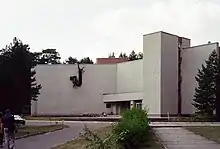Institute for High Energy Physics
State Research Center – Institute for High Energy Physics (IHEP) is a research organisation in Protvino (near Moscow, Moscow Oblast), Russia. It was established in 1963.[1]
 | |
| Established | 1963 |
|---|---|
| Research type | High energy physics and particle physics |
| Director | Professor Nikolai E. Tyurin |
| Location | Protvino, Russia 54.8678°N 37.2030°E |
| Website | www.ihep.ru |

The institute is known for the particle accelerator U-70 synchrotron launched in 1967 with the maximum proton energy of 70 GeV, which had the largest proton energy in the world for five years.[2]
The first director of the institute from 1963 to 1974 was Anatoly Logunov. From 1974 to 1993, professor Lev Solovyov (Russian: Лев Дмитриевич Соловьев) served as the director of the institute.[3] A professor, Nikolai E. Tyurin has been the director of the institute since 2003.[4]
In 1978, a scientist of the institute, Anatoli Bugorski, was irradiated by an extreme dose of proton beam. His demise was deemed inevitable as the doctors believed he had received a dosage far in excess of what could be considered fatal. However, he survived the accident and continued to work in the institute.[5]
See also
- UNK proton accelerator, a powerful accelerator that was planned to be built at Protvino but was not built after the collapse of the Soviet Union
- Budker Institute of Nuclear Physics, another Russian particle physics laboratory in Novosibirsk
- Institute for Theoretical and Experimental Physics, another Russian particle physics laboratory in the vicinity of Moscow; located in Moscow proper
- Joint Institute for Nuclear Research, international particle physics laboratory in the vicinity of Moscow; located north of Moscow
References
- ИФВЭ, История [IHEP, history] (in Russian).
- Nikolai Tyurin (1 November 2003). "Forty years of high-energy physics in Protvino". CERN Courier. Retrieved 17 November 2007.
- Ушёл в вечность Лев Дмитриевич Соловьёв [Lev Dmitrievich Solovyov passed away] (in Russian). Обсуждение на LiveInternet – Российский Сервис Онлайн-Дневников.
- О профессорах кафедры – Тюрин Николай Евгеньевич [About professors of the department – Tyurin Nikolai Evgenievich] (in Russian). "Кафедра квантовой теории и физики высоких энергий" [Department of quantum theory and high energy physics].
- Gessen, Masha. "The Future Ruins of the Nuclear Age". WIRED. Retrieved 21 January 2017.